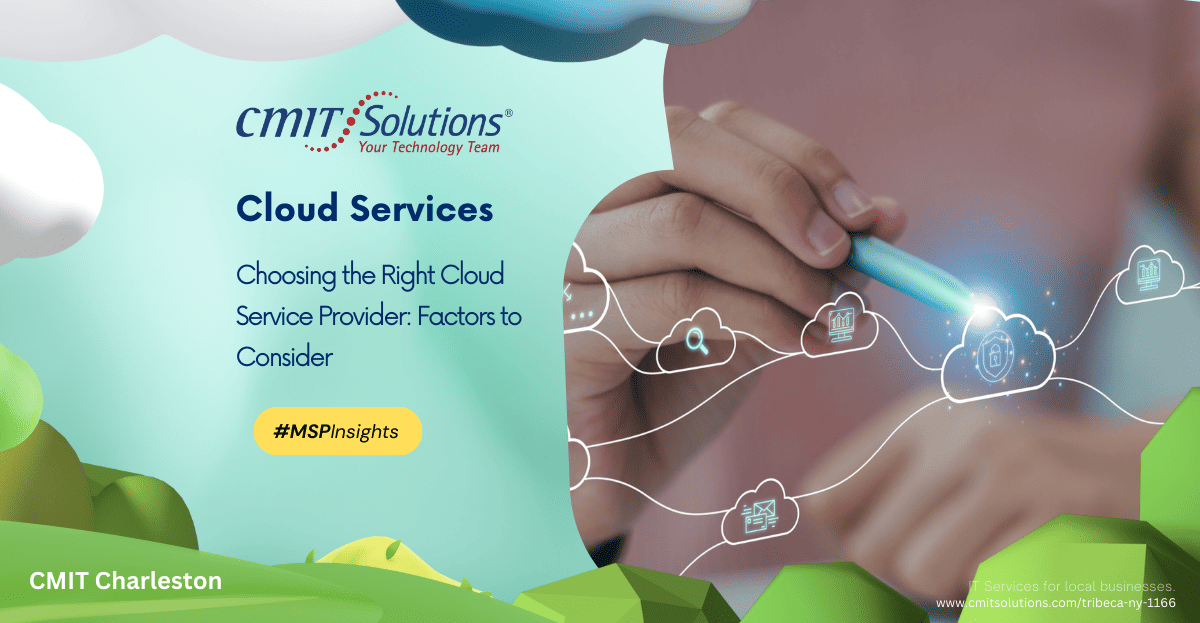In today’s digital era, businesses are increasingly reliant on cloud computing to drive innovation, enhance collaboration, and improve operational efficiency. However, with a multitude of cloud service providers vying for attention in the market, selecting the right partner can be a daunting task. To help navigate this complex landscape, CMIT Charleston presents an in-depth exploration of key factors to consider when choosing a cloud service provider.
Understanding Your Needs
The foundation of any successful cloud migration strategy lies in a comprehensive understanding of your organization’s unique requirements and objectives. Before delving into the selection process, take the time to conduct a thorough assessment of your current IT infrastructure, business processes, regulatory obligations, and long-term goals. By gaining clarity on these aspects, you can effectively prioritize your needs and align them with the capabilities offered by potential cloud service providers.
Security Measures
Security remains a top concern for businesses entrusting their sensitive data to external cloud environments. When evaluating cloud service providers, prioritize security features and protocols that safeguard your data against evolving threats. Look for providers that employ robust encryption techniques, multifactor authentication mechanisms, and intrusion detection systems to fortify your defenses. Additionally, inquire about compliance certifications such as ISO 27001 and SOC 2, which validate the provider’s adherence to industry best practices and regulatory requirements.
Scalability and Flexibility
The ability to scale resources seamlessly in response to changing demands is a hallmark of cloud computing. Assess the scalability and flexibility capabilities of prospective providers to ensure they can accommodate your organization’s growth trajectory and evolving needs. Look for features such as auto-scaling functionality, elastic compute instances, and dynamic resource allocation, which empower you to optimize performance while controlling costs. A scalable cloud infrastructure lays the groundwork for agility and innovation, enabling your business to thrive in a rapidly evolving landscape.
Performance and Reliability
Performance and reliability are paramount considerations when selecting a cloud service provider, particularly for mission-critical applications and services. Evaluate the provider’s track record in delivering consistent performance and meeting service-level agreements (SLAs). Look for indicators such as network uptime guarantees, latency benchmarks, and geographic redundancy to mitigate the risk of downtime and service interruptions. A reliable cloud infrastructure forms the backbone of your digital operations, empowering you to deliver seamless experiences to customers and stakeholders alike.
Cost and Pricing Structure
While cost should not be the sole determinant in your decision-making process, it’s essential to evaluate the total cost of ownership (TCO) associated with each cloud service provider. Take a holistic approach to cost analysis, considering factors such as subscription fees, usage-based charges, data transfer costs, and potential hidden fees. Explore pricing models such as pay-as-you-go, reserved instances, and spot instances to optimize cost-efficiency while balancing performance and scalability requirements. A transparent pricing structure enables you to forecast expenses accurately and maximize return on investment (ROI) in the cloud.
Data Backup and Disaster Recovery
Data loss and downtime can have catastrophic consequences for businesses, underscoring the importance of robust backup and disaster recovery mechanisms. Evaluate the provider’s data protection strategies, including backup frequency, data retention policies, and disaster recovery capabilities. Look for features such as automated backups, geo-redundant storage, and failover mechanisms that ensure business continuity in the event of unforeseen disruptions. Implementing a comprehensive data backup and disaster recovery plan safeguards your critical assets and minimizes the impact of disruptions on your operations.
Customer Support and Service Level Agreements (SLAs)
Responsive and reliable customer support is essential for addressing issues promptly and maintaining operational continuity in the cloud. Prioritize providers that offer comprehensive customer support options, including 24/7 availability, multiple communication channels, and dedicated account management. Review SLAs carefully to understand the provider’s commitments regarding response times, resolution procedures, and compensation for service disruptions. Effective customer support enhances your confidence in the provider’s ability to resolve issues expediently and prioritize your business needs.
Compliance and Regulatory Requirements
In an increasingly regulated business environment, compliance with industry-specific regulations and standards is non-negotiable. Verify that potential cloud service providers adhere to relevant compliance frameworks such as GDPR, HIPAA, PCI DSS, and SOC 2, depending on your industry and geographic location. Inquire about the provider’s data governance practices, audit trails, and compliance reporting mechanisms to ensure alignment with regulatory requirements. Partnering with a compliant cloud service provider mitigates legal risks and instills trust among customers and stakeholders.
Conclusion
Choosing the right cloud service provider is a strategic imperative for businesses seeking to leverage the power of cloud computing for growth and innovation. By meticulously evaluating factors such as security measures, scalability, performance, cost, data management capabilities, customer support, and compliance adherence, you can make an informed decision that aligns with your organization’s objectives. CMIT Charleston is committed to guiding businesses through the intricacies of cloud adoption and empowering them to harness the full potential of cloud technologies. With our expertise and personalized approach, you can embark on your cloud journey with confidence, knowing that your data is secure, your operations are optimized, and your business is primed for success in the digital age.




